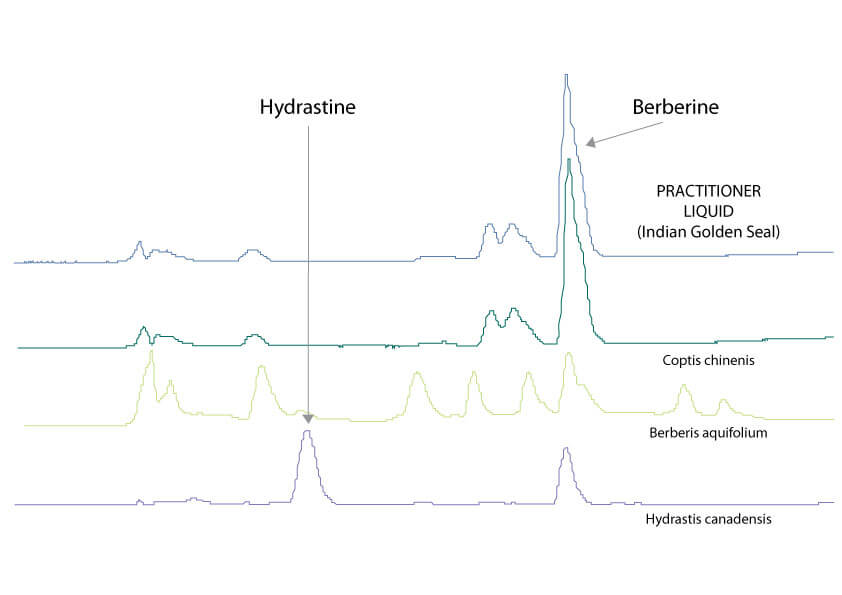These herbs have been traditionally used in herbal preparations to:
The five powerful herbs in Sinus Forte contain iridoid glycosides (especially aucubin), saponins, flavonoids, diterpenoid lactones, caffeic acid derivatives (especially cichoric acid), alkylamides, alkaloids (especially hydrastine and berberine), pungent principles (particularly capsaicin), carotenoids and other compounds.

Golden Seal (Hydrastis canadensis) is an endangered herb and as a result is very expensive and often substituted with other herbs.
The substituted herbs usually contain the substance berberine which provides the yellow color, but they do not contain hydrastine which is unique to Golden Seal. Only HPLC enables this differentiation to be made. MediHerb only buys cultivated Golden Seal to ensure long term sustainability of the herb. MediHerb tests each batch of Golden Seal raw material and finished product to ensure the claimed levels of hydrastine and berberine are present. Using HPLC, MediHerb is able to clearly differentiate true Golden Seal from other berberine-containing herbs. The table demonstrates the difference between the various berberine-containing species. The top trace is an example of substitution where a professional product being sold in Australia as Indian Golden Seal matched the trace of Coptis chinensis.
Echinacea is the most widely used herb and the most misunderstood. MediHerb has for many years invested heavily into research on Echinacea to identify quality markers that are important for clinical use. The levels of the phenolic acid esters, e.g. echinacoside, are commonly used by many manufacturers as marker compounds or indicators of Echinacea quality. However, trials have highlighted the significance of alkylamides for clinical efficacy, hence it is important that quality products are characterized for these phytochemicals as well. This has led to the incorporation of a specification and analytical test methodology for Echinacea products in the USP26-NF21 draft monographs which focuses on alkylamides tested by HPLC and DAD detection. The alkylamides being tested are the 2,4-diene alkylamides and the 2-ene alkylamides.
This method has been adopted by MediHerb and the alkylamides are determined as 2,4-diene alkylamides and 2-ene alkylamides. The 2-enes are characteristic of Echinacea angustifolia and are not found in the other species. The 2,4-dienes are found in both E. purpurea and E. angustifolia and these phytochemicals are responsible for the intense tingling sensation in the mouth when tasting good quality Echinacea products.
The phenolic acids are determined as the levels of caftaric acid, echinacoside and cichoric acid; echinacoside is typical of E. angustifolia and E. pallida roots and is not found in E. purpurea. Cichoric acid is not found in E. angustifolia root, but is found in the aerial parts of all species and characteristically in the root of E. purpurea.
MediHerb products are quantified to contain a minimum level of alkylamides by the USP26-NF21 HPLC method, the levels of phenolic acids are measured for information only and are used to confirm product identity and the absence of contamination from other Echinacea species.
MediHerb has developed specialized knowledge in the manufacture and testing of Echinacea products over the past 20 years. This includes a PhD study, extensive analytical method development, establishment of optimal harvesting, drying and storage protocols to maximize retention of actives and a successful clinical trial.

Enhances healthy immune system function*

Short-term immune system support*

Antioxidant support*

Seasonal stress, immune, respiratory & skin health support*

Supports healthy throat tissue and soothes mucous membranes*
Suggested Use:
1 tablet 3 - 4 times daily, or as directed.
Caution: Contraindicated in pregnancy and lactation. Contraindicated in known allergy to Golden Rod. For other contraindications and cautions consult your health care professional. Keep out of reach of children. Store in a cool, dry place out of direct sunlight.
For other contraindications and cautions, please refer to the Potential Herb-Drug Interactions Chart. The chart can be found here: Potential Herb-Drug Interactions Chart

Nutrients & Ingredients
Each Serving Size (1 Tablet) contains: Eyebright herb 5:1 extract 130 mg (from Euphrasia officinalis herb 650 mg), Golden Rod herb 4:1 extract 162.5 mg (from Solidago virgaurea herb 650 mg), Echinacea root 7:1 extract 52.86 mg (from Echinacea purpurea root 370 mg), Golden Seal root & rhizome 4:1 extract 31.25 mg (from Hydrastis canadensis root & rhizome 125 mg), Cayenne fruit 2:1 extract 5 mg (from Capsicum annuum fruit 10 mg). Other Ingredients: Microcrystalline cellulose, dibasic calcium phosphate dihydrate, croscarmellose sodium, silicon dioxide, sodium starch glycolate, magnesium stearate and hypromellose.
Please consult the product packaging label for the most accurate product information.